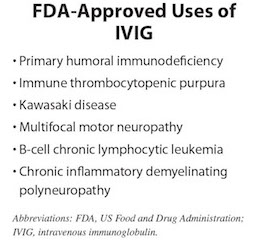What Experts Say About Intravenous Immunoglobulin IVIG Treatment For Autoimmune Disease
What Experts Say About Intravenous Immunoglobulin IVIG Treatment For Autoimmune Disease
My brilliant, Russian Neurologist ( I think she is Russian) slowly shakes her head side to side as she goes over my test results.
As she finishes reviewing my stack of test results, she stares at me and does not say a word.
I speak first.
Our conversation begins with me saying to the Neurologist, I know, I look fine. Somedays, I even look good, but I feel terrible. Most days my energy level is zero to none and piece by piece my body is breaking down.
I then go on to tell the Neurologist my Easter Bunny analogy. The story goes like this; my body is similar to a chocolate Easter Bunny. The chocolate Easter Bunny looks delicious, but when you bite off one of the bunny’s ears, you discover the entire Easter Bunny is hollow.
The Neurologist shakes her head in agreement.
She then goes through my lab results with me, answers dozens of my questions and confirms that my body is host to rare and not so rare diseases.
The Neurologist inquires if I have tried, Intravenous Immunoglobin IVIG?
I say, no but I add that I believe Intravenous Immunoglobin IVIG treatment may be helpful.
The Neurologist agrees and says; she will get started on the paperwork.
I think, about the paperwork a.k.a. Insurance authorization, ugh.
Fast forward several weeks, and my health insurance company has approved my Intravenous Immunoglobin IVIG treatment.
What Is Intravenous Immunoglobin IVIG Treatment?
Intravenous Immunoglobulin (IVIG) is a blood product prepared from the serum of between 1000 and 15000 donors per batch. It is the treatment of choice for patients with antibody deficiencies.
Is Intravenous Immunoglobin IVIG Treatment Effective?
Intravenous Immunoglobin IVIG treatment has shown effectiveness for numerous autoimmune diseases.
The Food and Drug Administration (FDA)-approved indications for immune globulin therapy are limited, but a large number of diseases, especially those seen by neurologists, have shown potentially beneficial responses to IVIG.
Based on controlled clinical trials IVIG is now recognized as first-line therapy in patients with Guillain–Barré syndrome (GBS), chronic inflammatory demyelinating polyneuropathy (CIDP), and multifocal motor neuropathy (MMN).
Intravenous Immunoglobulin is an effective rescue therapy in some patients with worsening myasthenia gravis (MG) and beneficial as second-line therapy in patients with dermatomyositis and stiff-person syndrome.
Despite Intravenous Immunoglobulin IVIG widespread use and broad efficacy, the mechanisms that confer the anti-inflammatory or immunomodulating activity in autoimmune disease conditions are poorly understood.
In a large number of case series but not controlled studies, IVIG is also promising in treating various neuroinflammatory, painful, or even neurodegenerative disorders.
The rarity and demand for Intravenous Immunoglobin IVIG cause the medication to be expensive. As a result of IVIG cost and usage, IVIG treatment is not always approved by insurance carriers.
I am fortunate my health insurance carrier approved my Intravenous Immunoglobin IVIG treatment.
With my fingers crossed, I will begin IVIG treatment this Friday.
Updates, on my IVIG treatment to follow.
I hope this HypoGal Blog, What Experts Say About Intravenous Immunoglobulin IVIG Treatment For Autoimmune Disease has been insightful.
Resources: https://www.ncbi.nlm.nih.gov/pmc/articles/PMC1809480/
https://www.ncbi.nlm.nih.gov/pmc/articles/PMC4720677/
You can find additional health tips to living with a chronic illness on the HypoGal website.
Please, Like, HypoGal on Facebook.
If you enter your email address at the bottom of this page ↓ you will receive HypoGal’s updates. It’s FREE! 🙂

